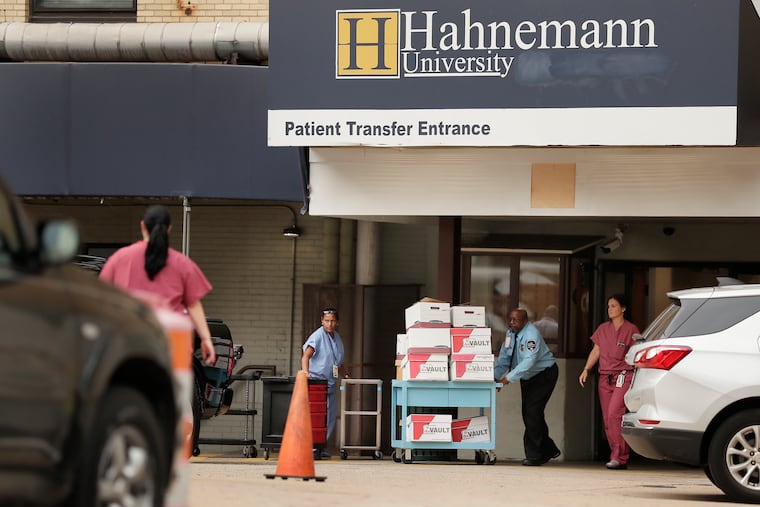Is Hahnemann a ‘zombie hospital’? Appeal of residency program sale hinges on that argument.
The $55-million sale, which federal regulators want blocked because they consider it illegal, was approved by a bankruptcy court judge — the Sept. 5 approval hinged, at the simplest level, on whether Hahnemann was open or closed at the time of the sale.

A federal judge was skeptical of the arguments made by lawyers in favor of the sale of the hundreds of medical residency slots at bankrupt Hahnemann University Hospital.
A bankruptcy judge’s approval of the $55 million sale, which federal regulators want blocked because they consider it illegal, hinged, at the simplest level, on whether Hahnemann was still in business.
In her oral decision last week temporarily blocking the sale to Thomas Jefferson University Hospitals Inc., U.S. District Court Judge Maryellen Noreika tossed cold water on the assertion that the hospital, which discharged its last inpatient on July 26, was technically open and providing services to the public despite the absence of doctors and inpatients.
Noreika’s ruling on the stay was not a final decision. Another judge has been assigned to handle the appeal.
A U.S. Department of Justice lawyer, representing the Centers for Medicare and Medicaid Services (CMS), has argued that the residency slots and the millions of dollars in CMS funding that go with them were not property that can be sold. CMS said it should be the one to decide whether Hahnemann, which it described as a “zombie hospital,” was open or closed.
To win an approval for the sale, lawyers for Hahnemann and Jefferson had convinced U.S. Bankruptcy Judge Kevin Gross that Hahnemann was still in business because it was “providing referral services, forwarding copies of medical records, and subletting to other testing services.”
In her Sept. 16 ruling about eight hours before the sale could have been completed, Noreika said it was not clear that Hahnemann was still in business.
“There is no case law or regulation cited supporting the assertion that such activities meet the 'services’ of the statutory requirement. And there is a significant question as to whether that is what is covered in ‘providing services to the community’ in the statute,” Noreika said in her ruling, according to a transcript filed in bankruptcy court.
The judge also addressed the more complicated matter of whether Hahnemann’s Medicare provider agreement, which is technically what would be sold, is a property that can be sold under bankruptcy rules or a contract that must be handled differently.
She found that CMS raised a “substantial question” of whether the bankruptcy judge erred in finding that the Medicare agreement, which comes with the money for the residents, could be sold.
The first step in her decision to grant the stay was deciding that the government has a “reasonable chance” of succeeding. Three other tests for granting a stay involve questions of harm to both parties if the stay is or isn’t granted and whether the stay is in the public interest.
On the questions of harm, she said CMS had demonstrated that the sale “likely irreparably harms CMS by undermining its authority to carry out its responsibilities in redistributing residency slots upon the closing of a hospital.”
As to the possibility that Hahnemann would be harmed if the Pennsylvania Department of Health terminates the hospital’s license, as the agency is allowed to do after Sept. 30 under the sale order, she said that “would not be a preventable harm, but merely a state enforcing the law because the hospital does not meet the state’s requirements.”
Finally, public interest would be served, the judge said, if CMS were able to follow its process for redistributing residency slots when a hospital closes. That process gives preference to hospitals in the same area served by the closed hospital.
Under the CMS process, “other hospitals would have an opportunity to increase their own number of residents by applying for residency slots and articulate why they should be able to expand their respective training programs,” Noreika said. “It is in the public’s interest that other hospitals serving critical needs have that opportunity.”
Despite her criticism of the arguments by Hahnemann and Jefferson, Noreika said the appeal is not a sure win for the government.
“This case represents substantial issues involving complex regulations and novel arguments. The end result could go either way,” she said.